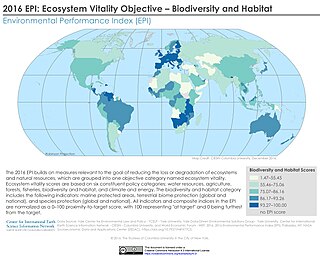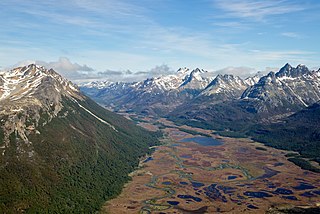
Biodiversity or biological diversity is the variety and variability of life on Earth. Biodiversity is a measure of variation at the genetic, species, and ecosystem level. Biodiversity is not distributed evenly on Earth; it is usually greater in the tropics as a result of the warm climate and high primary productivity in the region near the equator. Tropical forest ecosystems cover less than 10% of earth's surface and contain about 90% of the world's species. Marine biodiversity is usually higher along coasts in the Western Pacific, where sea surface temperature is highest, and in the mid-latitudinal band in all oceans. There are latitudinal gradients in species diversity. Biodiversity generally tends to cluster in hotspots, and has been increasing through time, but will be likely to slow in the future as a primary result of deforestation. It encompasses the evolutionary, ecological, and cultural processes that sustain life.

Conservation biology is the study of the conservation of nature and of Earth's biodiversity with the aim of protecting species, their habitats, and ecosystems from excessive rates of extinction and the erosion of biotic interactions. It is an interdisciplinary subject drawing on natural and social sciences, and the practice of natural resource management.
Coextinction and cothreatened refer to the phenomena of the loss or decline of a host species resulting in the loss or endangerment of an other species that depends on it, potentially leading to cascading effects across trophic levels. The term originated by the authors Stork and Lyal (1993) and was originally used to explain the extinction of parasitic insects following the loss of their specific hosts. The term is now used to describe the loss of any interacting species, including competition with their counterpart, and specialist herbivores with their food source. Coextinction is especially common when a keystone species goes extinct.

Human impact on the environment refers to changes to biophysical environments and to ecosystems, biodiversity, and natural resources caused directly or indirectly by humans. Modifying the environment to fit the needs of society is causing severe effects including global warming, environmental degradation, mass extinction and biodiversity loss, ecological crisis, and ecological collapse. Some human activities that cause damage to the environment on a global scale include population growth, neoliberal economic policies and rapid economic growth, overconsumption, overexploitation, pollution, and deforestation. Some of the problems, including global warming and biodiversity loss, have been proposed as representing catastrophic risks to the survival of the human species.

Reconciliation ecology is the branch of ecology which studies ways to encourage biodiversity in the human-dominated ecosystems of the anthropocene era. Michael Rosenzweig first articulated the concept in his book Win-Win Ecology, based on the theory that there is not enough area for all of earth's biodiversity to be saved within designated nature preserves. Therefore, humans should increase biodiversity in human-dominated landscapes. By managing for biodiversity in ways that do not decrease human utility of the system, it is a "win-win" situation for both human use and native biodiversity. The science is based in the ecological foundation of human land-use trends and species-area relationships. It has many benefits beyond protection of biodiversity, and there are numerous examples of it around the globe. Aspects of reconciliation ecology can already be found in management legislation, but there are challenges in both public acceptance and ecological success of reconciliation attempts.

Beth Alison Shapiro is an American evolutionary molecular biologist. She is a professor in the Department of Ecology and Evolutionary Biology at the University of California, Santa Cruz. Shapiro's work has centered on the analysis of ancient DNA. She was awarded a MacArthur Fellowship in 2009 and a Royal Society University Research Fellowship in 2006.

Freshwater swamp forests, or flooded forests, are forests which are inundated with freshwater, either permanently or seasonally. They normally occur along the lower reaches of rivers and around freshwater lakes. Freshwater swamp forests are found in a range of climate zones, from boreal through temperate and subtropical to tropical.

Jane Lubchenco is an American environmental scientist and marine ecologist who teaches and conducts research at Oregon State University. Her research interests include interactions between the environment and human well-being, biodiversity, climate change, and sustainable use of oceans and the planet. From 2009 to 2013, she served as Administrator of NOAA and Under Secretary of Commerce for Oceans and Atmosphere. In February 2021, she was appointed by President Joe Biden to serve as Deputy Director for Climate and Environment in the White House Office of Science and Technology Policy.
Palm oil, produced from the oil palm, is a basic source of income for many farmers in South East Asia, Central and West Africa, and Central America. It is locally used as cooking oil, exported for use in much commercial food and personal care products and is converted into biofuel. It produces up to 10 times more oil per unit area than soybeans, rapeseed or sunflowers.

Stuart Leonard Pimm is the Doris Duke Chair of Conservation Ecology at Duke University. His early career was as a theoretical ecologist but he now specialises in scientific research of biodiversity and conservation biology.

A peatland is a type of wetland whose soils consist of organic matter from decaying plants, forming layers of peat. Peatlands arise because of incomplete decomposition of organic matter, usually litter from vegetation, due to water-logging and subsequent anoxia. Like coral reefs, peatlands are unusual landforms that derive mostly from biological rather than physical processes, and can take on characteristic shapes and surface patterning.

William F. Laurance, also known as Bill Laurance, is Distinguished Research Professor at James Cook University, Australia and has been elected as a Fellow of the Australian Academy of Science. He has received an Australian Laureate Fellowship from the Australian Research Council. He held the Prince Bernhard Chair for International Nature Conservation at Utrecht University, Netherlands from 2010 to 2014.

Katherine Jane Willis, Baroness Willis of Summertown, is a British biologist, academic and life peer, who studies the relationship between long-term ecosystem dynamics and environmental change. She is Professor of Biodiversity in the Department of Zoology at the University of Oxford, and an adjunct professor in biology at the University of Bergen. In 2018 she was elected Principal of St Edmund Hall, and took up the position from 1 October. She held the Tasso Leventis Chair of Biodiversity at Oxford and was founding Director, now Associate Director, of the Biodiversity Institute Oxford. Willis was Director of Science at the Royal Botanic Gardens, Kew from 2013 to 2018. Her nomination by the House of Lords Appointments Commission as a crossbench life peer was announced on 17 May 2022.

Conservation Drones is a conservation organization co-founded by Lian Pin Koh and Serge Wich to make and promote the use of unmanned aerial vehicles (UAVs) for biodiversity conservation applications. The Conservation Drone project shares their experiences of UAV building and using low cost UAVs. This Project has grown to become a worldwide initiative to raise awareness of conservation challenges in certain regions, and inspire others to adopt emerging technologies for conservation.

Biodiversity loss includes the worldwide extinction of different species, as well as the local reduction or loss of species in a certain habitat, resulting in a loss of biological diversity. The latter phenomenon can be temporary or permanent, depending on whether the environmental degradation that leads to the loss is reversible through ecological restoration/ecological resilience or effectively permanent. The current global extinction, has resulted in a biodiversity crisis being driven by human activities which push beyond the planetary boundaries and so far has proven irreversible.
Eric L. Berlow is an American ecologist and data scientist. He co-founded a visual data interface company, which was acquired by Rakuten Inc. in 2016. He now runs Vibrant Data Labs, a social impact data science group currently focused the building on an open-source framework for tracking the flows of money to climate mitigation and resilience efforts on the ground. Prior to Vibrant Data Labs, Berlow was the founding director of the University of California's first science and education institute inside Yosemite National Park which facilitated efforts to leverage data for informing conservation policy and natural resource management. Berlow is internationally recognized for his research on ecological complexity, with articles in Nature, Science, and Proceedings of the National Academy of Sciences. He is best known for his TED talks on simplifying complexity and finding hidden patterns in complex data. Berlow has received a TED Fellowship, a TED Senior Fellowship, an Alexander Von Humboldt Fellowship, a National Science Foundation Post-doctoral Fellowship, and a National Center for Ecological Analysis and Synthesis Fellowship. He was named one of the top 100 Creatives by Origin magazine.
Nyeema Charmaine Harris is an American environmental scientist who is Associate Professor and Director of the Applied Wildlife Ecology Laboratory at the University of Michigan. Her research considers mammalian carnivores and conservation.

Shahid Naeem is an ecologist and conservation biologist and is a Lenfest Distinguished professor and chair in the Department of Ecology, Evolution, and Environmental Biology at Columbia University. Naeem is the author of Biodiversity, Ecosystem Functioning, and Human Well-Being, and has published over 100 scientific articles.

Rhett Ayers Butler is an American journalist, author and entrepreneur who founded Mongabay, a conservation and environmental science news platform, in 1999.

Graeme C. Hays is a British and Australian marine ecologist known for his work with sea turtles and plankton. He is the Alfred Deakin Professor of Marine Science at Deakin University, Australia.
















